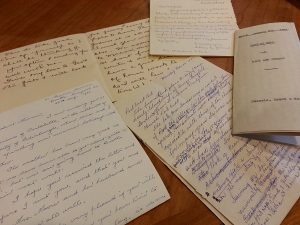
Source: https://peelarchivesblog.com/2015/08/26/how-do-archivists-organize-collections/
In 1943, Leo Otsuki was removed from his home of Surrey, BC following the development of government policies that interned Japanese-Canadians in World War II. From his new home in North Kildonan, Manitoba, Leo kept in contact with school friend, Joan Gillis, through the sending and receiving of letters. Nearly eighty years later, Leo’s side of the correspondence now resides in the Rare Books and Special Collections at the University of British Columbia.
Though six letters remain of Joan and Leo’s correspondence, this post will analyze the fourth letter written by Leo as an autobiographical document. The letter provides a clear example of the role of storytelling in written correspondence. Due to the delayed nature of conversation through the post, letters can contain a stream of consciousness that develops when talking to an absent recipient. Leo demonstrates this through his in-depth and honest recounting of his recent change in location; he has now moved from Manitoba to Montreal to become a student at McGill University.
After addressing the confusion of his new address, he launches into an explanation of how he landed an acceptance at McGill. He begins by reviewing the grades he received on his high school final exams, boasting averages in the 90th percentile. Although this information establishes Leo as a highly qualified candidate for higher education, he reveals that he was rejected by over half a dozen Canadian institutions. By supplying examples of the reasoning for each rejection, it becomes clear that it was never because of his capability in academia. Furthermore, the tone of his penmanship reveals that he is not ignorant to the real reason behind his rejection. In this period of war and discrimination, his rejection was because he was Japanese. This knowledge, however, must remain implicit between Joan and Leo; as clearly stated on stamps decorating the letter’s envelope, the letter was analyzed by government officials responsible for tracking communication by Japanese individuals. This factor inhibits the ability of Leo to be completely transparent, despite the opportunity for uninterrupted openness that typical letter writing presents. As a result, the true intentions of his letter can only be revealed through an analysis of tone, content and context.
Though feeling discouraged, Leo lastly applied to McGill after his brother in Montreal informed him of the institution’s leniency with admissions. Leo explains that he only applied out of curiosity, wondering what reason they would give for his rejection. Alas, he received an acceptance and promptly moved to begin his schooling. However, Leo does not attempt to conceal his ill view of the city and campus, constantly comparing it to the University of British Columbia and revealing his longing for his real home. These confessions contribute the importance of this letter as a representation of his true experience, providing both factual evidence and personal insight.
The length and self-reflection of this letter allow it to delve deeper than casual pleasantries shared between two friends. Leo’s letter, instead, is a story of rejection and discouragement that couple to develop the most prominent theme of displacement. While Joan had the privilege of remaining in Surrey, Leo was bounced across the country without ever truly belonging. By recounting the entirety of his experience, Leo’s letter to Joan becomes a form of autobiography. Though only providing a brief glimpse at his life, the letter is Leo’s story—an individual experience he decided was monumental enough to write down and share. Its archival presence today allows scholars to analyze the correspondence and develop an understanding of the value of letters in representing an experience.
Works Cited:
Otsuki, Leo. Letter to Joan Gillis. 31 October 1943. RBSC-ARC-1786, Box 2, Folder 4. Joan Gillis
Fonds. Rare Books and Special Collections, University of British Columbia, Vancouver.